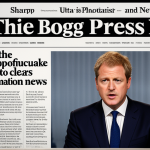Immediate Implications of Recent UK Government Policies
Recent UK government policies have rapidly reshaped the nation’s global influence and international relations. Central to this shift is the post-Brexit stance, which continues to redefine the UK’s diplomatic landscape, affecting both longstanding alliances and emerging partnerships. These policies emphasize stronger sovereignty and control over trade and immigration, resulting in noticeable changes in how other countries engage with the UK.
The Brexit impact has introduced complexities in UK foreign policy, particularly concerning trade agreements and regulatory standards. By diverging from the EU framework, the UK faces new negotiation challenges with key partners, affecting its standing in global markets. This transition has caused some tension in diplomatic ties, especially with EU nations, but has also opened doors to forging fresh bilateral agreements elsewhere.
Also read : How is the UK press handling misinformation and fake news?
Experts note an immediate recalibration in the UK’s international profile. Some view this as a bold assertion of independence that could enhance global influence if managed deftly. Others warn that a perceived retreat from multilateralism might diminish the UK’s diplomatic weight. Overall, recent UK government policies signal both opportunity and uncertainty in shaping the nation’s role on the world stage.
Shifts in International Alliances and Diplomatic Engagement
Recent UK government policies have significantly influenced the country’s UK global alliances and diplomatic strategy, with profound effects on international relations. The UK’s recalibrated stance has caused ripples across longstanding partnerships, particularly in how it engages within multinational forums such as the UN, NATO, and G7. The UK aims to assert a more autonomous role, sometimes leading to friction but also creating opportunities for leadership.
Also read : What Are the Implications of Emerging Trends in UK Politics?
In terms of UK-EU relations, shifts have been pronounced. While Brexit impact initially strained cooperation, diplomatic channels remain active, balancing divergence with pragmatic collaboration. EU partners often view these policies cautiously, gauging the UK’s commitment to shared regional stability.
The Commonwealth, meanwhile, has seen renewed emphasis in UK diplomatic efforts. Recent policies prioritize strengthened ties with these nations, aiming to diversify partnerships and enhance collective influence.
Experts highlight that these developments are redefining the UK’s global presence. The recalibration towards sovereignty has been praised for ambition but also questioned for potential diplomatic isolation. In sum, the UK’s diplomatic strategy is adapting to a complex international landscape shaped by recent government policies, balancing autonomy with the need for enduring alliances.
Impact on Trade and Economic Partnerships
Recent UK government policies have directly reshaped the UK trade agreements landscape, especially in the context of post-Brexit trade realignments. The UK has actively pursued renegotiations and new bilateral deals to compensate for the altered relationship with the EU. This pivot aims to enhance the nation’s access to diverse markets while asserting greater control over trade rules.
The immediate consequence of these policy shifts is a mixed picture. On one hand, there is potential for increased competitiveness through tailored agreements aligned with the UK’s priorities. On the other, the disruption of previously seamless EU trade networks introduces complexities affecting supply chains and regulatory standards.
International economic impact has been evident: some global partners express cautious optimism, while others remain concerned about uncertainties in market access and tariffs. Experts highlight that the UK’s global market position is evolving but contingent on how swiftly and effectively these new trade policies are implemented.
In summary, recent UK government policies signal a significant transformation in economic partnerships. Their success will depend on balancing sovereignty with pragmatic international cooperation to maintain and grow the UK’s standing in the global marketplace.




